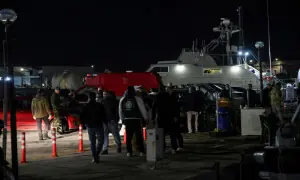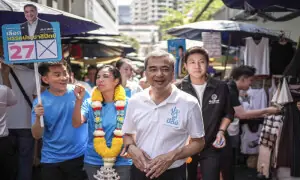Guns fall silent on Thai-Cambodia border as commanders seek to uphold truce
A ceasefire between Thailand and Cambodia held on Tuesday, and military commanders from both sides met to discuss measures to maintain the truce, as some residents along the disputed frontier trickled back home after five days of intense fighting.
Thai and Cambodian leaders met in Malaysia on Monday and agreed to a ceasefire to halt their deadliest conflict in more than a decade, which has killed at least 43 people, many of them civilians, and displaced over 300,000 in both countries.
Border areas remained calm, Thailand’s acting Prime Minister Phumtham Wechayachai told reporters in Bangkok, although he accused Cambodian troops of violating the ceasefire early on Tuesday.
Cambodia denied this, insisting its troops had strictly abided by the ceasefire since midnight, according to a statement by Defence Minister Tea Seiha.

Despite the initial jitters, military commanders from both sides held talks and agreed to maintain the ceasefire, stop any troop movement, and facilitate the return of the wounded and dead, Thai army spokesman Major-General Winthai Suvaree said.
Each side will establish a coordinating team of four to resolve any problems, Winthai told reporters.
Cambodia’s influential former premier Hun Sen, in a Facebook post, thanked “the armies of both Cambodia and Thailand for respecting and implementing this agreement”.
Further negotiations will continue at a meeting of the General Border Committee, which coordinates on border security, ceasefires, and troop deployments, scheduled for August 4 in Cambodia, the Thai army said.
The committee includes the defence ministers and senior military commanders from both countries.
In a statement, the Thai army said it had detained 18 Cambodian soldiers who surrendered.
A Cambodian defence ministry spokesperson did not immediately respond to questions on the detentions.
Both militaries have agreed not to deploy more troops along their disputed border, said Lim Menghour, Director-General of the Commission on Foreign Affairs and International Cooperation of the National Assembly of Cambodia, who also underlined the need for international observers to monitor the ceasefire.
Malaysia’s Defence Chief General Mohd Nizam Jaffar led a delegation to Thailand and Cambodia on Tuesday, the Malaysian army said in a statement, while a Chinese military spokesman said Beijing will maintain close communication with both countries to help consolidate the consensus over the ceasefire.
TALKS AND TRADE
Daily activity resumed in some parts of Thailand’s border areas, including the Kantharalak district, about 30 km from the frontline, where Chaiya Phumjaroen, 51, returned to town to reopen his shop.
“I am very happy that a ceasefire happened,” he said. “If they continue to fight, we have no opportunity to make money.”
The ceasefire deal reflected a rare convergence of interest between the US and China, which also pushed for the talks, but the agreement remains fragile, and third-party monitoring is essential to keep it in place, said Thitinan Pongsudhirak, a political scientist at Bangkok’s Chulalongkorn University.
“It cannot be left to Thailand and Cambodia to implement because the hostilities are running so deep now.”
For the latest news, follow us on Twitter @Aaj_Urdu. We are also on Facebook, Instagram and YouTube.

























Comments are closed on this story.